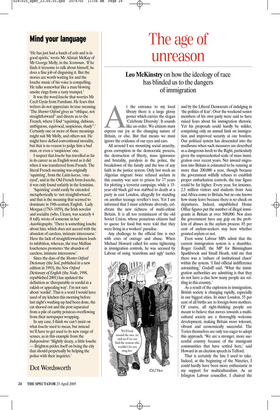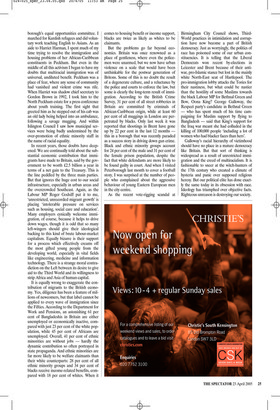The age of unreason
Leo MdKinstry on how the ideology of race has blinded us to the dangers of immigration At the entrance to my local library there is a large glossy poster which carries the slogan ‘Celebrate Diversity’. It sounds like an order. We citizens must express our joy at the changing nature of Britain, or else. But that means we must ignore the evidence of our eyes and ears.
All around I see mounting social anarchy, gross corruption in the democratic process, the destruction of liberty, mass ignorance and brutality, paralysis in the police, the breakdown of the family and the loss of any faith in the justice system. Only last week an Algerian migrant twice refused asylum in this country was sent to prison for 17 years for plotting a terrorist campaign, while a 15year-old black girl was stabbed to death at a party in east London, allegedly for standing on another teenage reveller’s toes. Yet I am informed that I must celebrate diversity, celebrate the new richness of multi-ethnic Britain. It is all too reminiscent of the old Soviet Union, whose penurious citizens had to queue for food but were told that they were living in a workers’ paradise.
Any challenge to the official line is met with cries of outrage and abuse. When Michael Howard called for some tightening in immigration controls, he was accused by Labour of using ‘scurrilous and ugly’ tactics and by the Liberal Democrats of indulging in ‘the politics of fear’. Over the weekend senior members of his own party were said to have raised fears about his immigration rhetoric. Yet his proposals could hardly be milder, comprising only an annual limit on immigration and improved security at our borders. Our political system has descended into the madhouse when such measures are described as a dangerous lurch to the Right, particularly given the unprecedented scale of mass immigration over recent years. Net inward migration into Britain is estimated to be running at more than 200,000 a year, though because the government wilfully refuses to establish proper embarkation controls, the true figure could be far higher. Every year, for instance, 2.5 million visitors and students from Asia and Africa come to Britain, but no one knows how many leave because there is no check on departures. Indeed, unpublished Home Office figures put the number of illegal immigrants in Britain at over 500,000. Nor does the government have any grip on the problem of abuses in the asylum process: 85 per cent of asylum-seekers stay here whether granted asylum or not.
Even some Labour MPs admit that the current immigration system is a shambles. Roger Godsiff, the MP for Birmingham Sparkbrook and Small Heath, told me that there was a ‘culture of institutional chaos’ within the system. ‘I find official indifference astonishing,’ Godsiff said. ‘What the immigration authorities are admitting is that they do not have a clue how many people are settling in this country.’ As a result of the explosion in immigration, British society is changing rapidly, especially in our biggest cities. In inner London, 55 per cent of all births are to foreign-born mothers. Of course, all right-thinking people are meant to believe that moves towards a multicultural society are a thoroughly welcome development, making Britain more tolerant, vibrant and economically successful. The Tories themselves are only too eager to adopt this approach. ‘We are a stronger, more successful country because of the immigrant communities that have settled here,’ said Howard in an election speech in Telford.
That is certainly the line I used to take. Indeed, at the beginning of the Nineties, I could hardly have been more enthusiastic in my support for multiculturalism. As an Islington Labour councillor, I chaired the borough’s equal opportunities committee. I marched for Kurdish refugees and did voluntary work teaching English to Asians. As an aide to Harriet Harman, I spent much of my time trying to resolve the immigration and housing problems of her African-Caribbean constituents in Peckham. But even in the middle of all this activism I began to have my doubts that multiracial immigration was of universal, undiluted benefit. Peckham was a place of fear, where any sense of community had vanished and violent crime was rife. When Harriet was shadow chief secretary to Gordon Brown in 1992, I took him to the North Peckham estate for a press conference about youth training. The first sight that greeted him as he stepped out of his cab was an old lady being helped into an ambulance, following a savage mugging. And within Islington Council I saw how municipal services were being badly undermined by the over-promotion of ethnic minority staff in the name of racial equality.
In recent years, those doubts have deepened. We are continually told about the substantial economic contribution that immigrants have made to Britain, said by the government to be worth £2.5 billion a year in terms of a net gain to the Treasury. This is the line peddled by the three main parties. But that ignores the huge cost to our social infrastructure, especially in urban areas and the overcrowded Southeast. Again, as the Labour MP Roger Godsiff put it to me, ‘unrestricted, unrecorded migrant growth’ is placing ‘intolerable pressure on services such as housing, social care and education’. Many employers cynically welcome immigration, of course, because it helps to drive down wages, though it is odd that so many left-wingers should give their ideological backing to this kind of brute labour-market capitalism. Equally bizarre is their support for a process which effectively creams off the most gifted young people from the developing world, especially in vital fields like engineering, medicine and information technology. There is a strange moral contradiction on the Left between its desire to give aid to the Third World and its willingness to strip Africa and Asia of human capital.
It is equally wrong to exaggerate the contribution of migrants to the British economy. Yes, diligence has been a feature of millions of newcomers, but that label cannot be applied to every wave of immigration since the Fifties. According to the Department for Work and Pensions, an astonishing 61 per cent of Bangladeshis in Britain are either unemployed or economically inactive, compared with just 23 per cent of the white population, while 45 per cent of Africans are unemployed. Overall, 41 per cent of ethnic minorities are without jobs — hardly the dynamic contribution so often portrayed in state propaganda. And ethnic minorities are far more likely to be welfare claimants than their white counterparts: 28 per cent of all ethnic minority groups and 34 per cent of blacks receive income-related benefits, compared with 18 per cent of whites. When it comes to housing benefit or income support, blacks are twice as likely as whites to be claimants.
But the problems go far beyond economics. Britain was once renowned as a place of gentleness, where even the policemen were unarmed, but we now have urban violence on a scale that would have been unthinkable for the postwar generation of Britons. Some of this is no doubt the result of a degenerate culture, and a reluctance by the police and courts to enforce the law, but some is clearly the long-term result of immigration. According to the British Crime Survey, 31 per cent of all street robberies in Britain are committed by criminals of African-Caribbean origin, while at least 60 per cent of all muggings in London are perpetrated by blacks. Only last week it was reported that shootings in Brent have gone up by 22 per cent in the last 12 months this in a borough that was recently paraded as a success story in driving down gun crime. Black and ethnic minority groups account for 24 per cent of the male and 31 per cent of the female prison population, despite the fact that white defendants are more likely to be found guilty in court. And when I visited Peterborough last month to cover a football story, I was surprised at the number of people who complained about the aggressive behaviour of young Eastern European men in the city centre.
As the recent vote-rigging scandal at Birmingham City Council shows, ThirdWorld practices in intimidation and corruption have now become a part of British democracy. Just as worryingly, the politics of race has poisoned some of our urban constituencies. It is telling that the Liberal Democrats won recent by-elections in Leicester and Brent because of their antiwar, pro-Islamic stance but lost in the mainly white North-East seat of Hartlepool. The pro-immigration lobby attacks the Tories for their nastiness, but what could be nastier than the hostility of some Muslims towards the black Labour MP for Bethnal Green and Bow, Oona King? George Galloway, the Respect party’s candidate in Bethnal Green — who has spent much of his time campaigning for Muslim support by flying to Bangladesh — said that King’s support for the Iraq war meant she had colluded in the killing of 100,000 people ‘including a lot of women who had blacker faces than hers’.
Galloway’s racial hierarchy of victimhood should have no place in a mature democracy like Britain. But that sort of thinking is widespread as a result of unrestricted immigration and the creed of multiracialism. It is fashionable to sneer at the witch-hunters of the 17th century who created a climate of hysteria and panic over supposed religious heresy. But our political elite has done exactly the same today in its obsession with race. Ideology has triumphed over objective facts. Righteous unreason is destroying our society.




















































 Previous page
Previous page